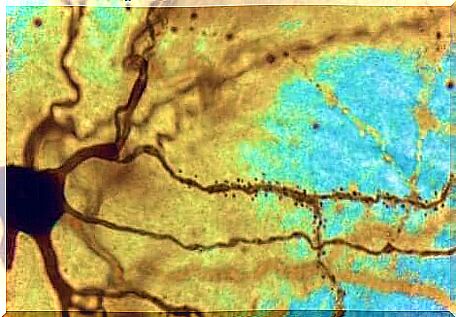Intelligent People’s Neurons Are Bigger

Is brain size related in any way to IQ? For the moment, this hypothesis has not been proven. However, science has revealed an interesting fact. We now know that the neurons of intelligent people are larger. In these people, the transmission of information is faster and the flow of ideas is more agile.
These data, curious as they may seem, continue to irritate part of the academic community. Somehow, relating “volumes” to “intellectual performance” seems somewhat reductionist and even simplistic. Because at the end of the day, intelligence is still very complex to assess and even define.
Despite this, the data is there. Scientists at the Human Brain Project have discovered that there is a direct relationship between the size of brain cells and the level of cognitive competence in people.
This discovery also opens up new possibilities, such as expanding the limit of human intelligence in the laboratory. A fact which, beyond the ethical implications, is still interesting …

Smart people’s brain cells are bigger, science says
The study led by Dr Natalia Goriounova of the Free University of Amsterdam was the first to show that the size of brain cells is directly related to a person’s level of intelligence. At higher density and connectivity, intellectual potential is greater.
Until today, we knew that the brain has around 100 billion neurons and that each of them collects and sends information through a series of chemical reactions and electrical signals. We knew its mechanics, but we didn’t have hard data to associate brain cell volume with cognitive performance.
For example, we had data from Albert Einstein’s brain analysis that pathologist Thomas Harvey stole after the autopsy in 1955. This analysis revealed, among other data, that the prefrontal cortex, responsible for spatial cognition and mathematical thinking was more developed.
She also revealed that the glial cells of the father of the theory of relativity were larger than average. Therefore, one way or another, we already had a few little clues that anticipated these results …
Frontal cortex and temporal lobes: increase in the volume of neurons
Analyzes of the work of the University of Amsterdam have shown that the neurons of intelligent people are larger. They also showed that in areas where there is a large part of brain cells have a greater branching: not only their volume is greater, but the connectivity is much higher.
All of this sets up a brain with more synapses in which information flows faster. Likewise, as evidenced by Einstein’s brain, the frontal cortex and temporal lobes have greater density and size in brighter people.
Why are the neurons of intelligent people bigger?
When we look at this data, obvious questions come to mind. Why are the neurons of intelligent people bigger? Can we increase this volume? According to the Human Brain Project, this peculiarity responds to genetic factors and processes that have not yet been fully clarified.
This is why the Free University of Amsterdam carried out a detailed analysis of each neuron in the active state, that is to say “alive”. To do this, they called in people who needed surgery because of a tumor or epileptic complications.
Before the operation, they underwent an intelligence test to identify those who had better intellectual abilities. And during the procedure, small samples of the prefrontal cortex and temporal lobes were extracted.
A much higher action potential was observed (the electric discharge wave that travels along the cell membrane). The results have not yet been published and we do not have conclusive data to date.

What are the implications of this discovery for the future?
Are we ever born intelligent or are we becoming bright beings through stimulation and the environment? This is the eternal question that science has asked itself over the decades. Today, we know that there are two types of intelligence: fluid intelligence and crystallized intelligence.
The first type is our basic intelligence. The second is the result of learning and experience. However, they are not exclusive and none have a set limit. Knowing this, what then does the cited discovery suppose? What could be the implication of knowing that the neurons of intelligent people are larger and have more connections?
Michele Giugliano, co-author and professor at the University of Antwerp, tells us that in the future we can arguably be able to create larger brain cells with embryonic and pluripotent stem cells. With this, we could restore brain material and reduce the cognitive deficit associated with injury or dementia , for example.










